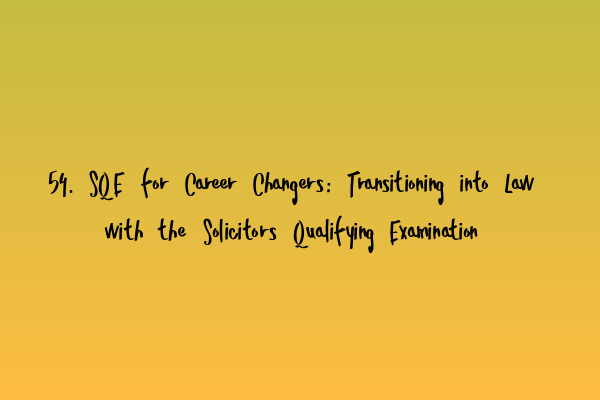54. SQE for Career Changers: Transitioning into Law with the Solicitors Qualifying Examination
Are you considering a career change into the field of law? The Solicitors Qualifying Examination (SQE) might be the perfect opportunity for you to make that transition. This new route to becoming a solicitor in England and Wales offers a streamlined and accessible path for individuals from diverse backgrounds to enter the legal profession. In this blog post, we will explore how the SQE can benefit career changers like yourself and provide some guidance on preparing for this important exam.
Understanding the SQE
The Solicitors Qualifying Examination is a two-part assessment that replaces the previous Qualified Lawyers Transfer Scheme (QLTS) and Legal Practice Course (LPC) route. The SQE assesses candidates on their knowledge and skills in a more flexible and practical manner. It evaluates both academic and practical competencies necessary for the practice of law.
Part 1: Functioning Legal Knowledge (FLK)
The first part of the SQE, known as Functioning Legal Knowledge (FLK), tests your understanding of key legal principles across various practice areas. This section consists of multiple-choice questions and is designed to gauge your legal knowledge and its application to practical scenarios.
If you are preparing for the FLK component, I recommend trying out some SQE 1 practice exam questions to familiarize yourself with the format and content of the test. Practicing with mock exams, such as the SQE 1 practice mocks (FLK1 FLK2), can greatly enhance your understanding of the subject matter and boost your confidence before the actual examination.
Part 2: Practical Legal Skills (PLS)
The second part of the SQE, called Practical Legal Skills (PLS), is a practical assessment that assesses your ability to apply legal knowledge to realistic scenarios. This section evaluates essential lawyering skills, such as legal research, client interviewing, advocacy, and case analysis. It includes both written and oral tasks that simulate real-life legal situations.
If you’re concerned about preparing for the PLS component of the SQE, there are SQE 2 preparation courses available that can help you develop and refine your practical legal skills. These courses typically offer comprehensive training and practice in the various tasks you are likely to encounter in the PLS assessment.
Why the SQE is Ideal for Career Changers
1. Accessibility: The SQE provides an accessible path for individuals from various backgrounds to enter the legal profession. Whether you have a non-law degree, extensive work experience, or come from a different profession altogether, the SQE offers a fair and open opportunity to pursue a legal career.
2. Cost-effectiveness: Compared to previous routes, the SQE offers a more cost-effective option for individuals looking to qualify as solicitors. By replacing the need for the LPC and other qualification routes, the SQE reduces the financial burden associated with traditional legal training.
3. Flexibility: The SQE is designed to accommodate those who may already be engaged in full-time work or have other commitments. With flexible scheduling and modular assessments, you can study and prepare for the exam at your own pace, allowing you to balance your career transition with other responsibilities.
4. Practical Skills Focus: The SQE places a strong emphasis on practical legal skills, ensuring that candidates are equipped with the necessary skills and knowledge to excel in the legal profession. This focus on practical application makes the SQE highly relevant and valuable for career changers who are seeking to transition smoothly into the legal field.
Preparing for the SQE
Now that you have a better understanding of the SQE and its benefits for career changers, it’s time to start preparing for the exam. Here are some tips to help you get started:
- Research and familiarize yourself with the SQE syllabus and assessment structure. Understanding what is expected of you will help you plan and allocate your study time effectively.
- Consider enrolling in an SQE preparation course, such as the SQE 1 preparation courses available. These courses provide structured learning materials, expert guidance, and valuable practice resources to help you succeed.
- Set a study schedule and stick to it. Consistency and discipline are key when preparing for any examination, and the SQE is no exception.
- Take advantage of practice resources, including mock exams, quizzes, and sample questions. Practicing under exam conditions will familiarize you with the format, build your confidence, and highlight areas that require further study.
- Join study groups or seek out online communities of fellow SQE candidates. Collaborating with others can provide support, motivation, and an opportunity to discuss and clarify difficult concepts.
- Stay updated with SRA SQE exam dates and other relevant announcements. Being well-informed about registration deadlines and other important dates will help you plan your preparation effectively.
Remember, the SQE is a comprehensive assessment that requires a combination of knowledge and practical skills. With dedication, proper preparation, and the right resources, you can successfully transition into a rewarding legal career through the SQE.
Good luck with your SQE journey!
